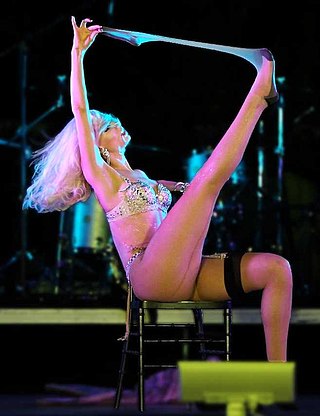
A striptease is an erotic or exotic dance in which the performer gradually undresses, either partly or completely, in a seductive and sexually suggestive manner. The person who performs a striptease is commonly known as a "stripper" or an "exotic" or "burlesque" dancer.

Jayne Mansfield was an American actress and Playboy Playmate. A sex symbol of the 1950s and early 1960s, Mansfield was known for her numerous publicity stunts and open personal life. Although her film career was short-lived, she had several box-office successes, and won a Theatre World Award and Golden Globe Award, and soon gained the nickname of Hollywood's "smartest dumb blonde."

Penelope Rosemont is a visual artist, writer, publisher, and social activist who attended Lake Forest College. She has been a participant in the Surrealist Movement since 1965. With Franklin Rosemont, Bernard Marszalek, Robert Green and Tor Faegre, she established the Chicago Surrealist Group in 1966. She was in 1964-1966 a member of the Industrial Workers of the World (IWW), commonly known as the Wobblies, and was part of the national staff of Students for a Democratic Society (SDS) in 1967-68. Her influences include Andre Breton and Guy Debord of the Situationist International, Emma Goldman and Lucy Parsons.

Mamie Van Doren is an American actress, singer, and sex symbol. She is perhaps best known for the rock 'n' roll, juvenile delinquency exploitation film Untamed Youth (1957).
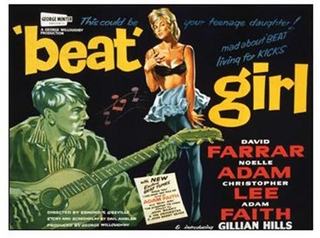
Beat' Girl is a 1960 British teen exploitation drama film directed by Edmond T. Gréville. The film was released in the United States under the title Wild for Kicks.
Too Hot to Handle may refer to:

The Girl Can't Help It is a 1956 American musical comedy film starring Jayne Mansfield in the title role, Tom Ewell, Edmond O'Brien, Henry Jones, and Julie London. The picture was produced and directed by Frank Tashlin, with a screenplay adapted by Tashlin and Herbert Baker from an uncredited 1955 short story, "Do Re Mi" by Garson Kanin. Filmed in DeLuxe Color, the production was originally intended as a vehicle for the American sex symbol Jayne Mansfield, with a satirical subplot involving teenagers and rock 'n' roll music. The unintended result has been called the "most potent" celebration of rock music ever captured on film.
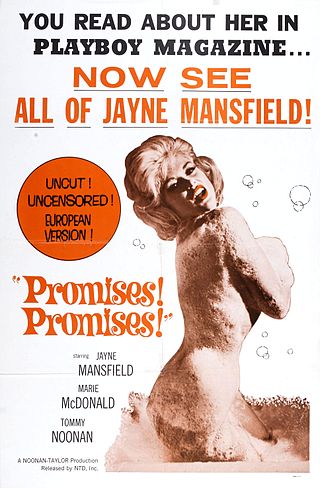
Promises! Promises! is a 1963 American sex comedy film directed by King Donovan and starring Tommy Noonan and Jayne Mansfield. Released at the end of the Production Code era and before the MPAA film rating system became effective in 1968, it was the first Hollywood film of the sound era to feature nudity by a mainstream star (Mansfield).
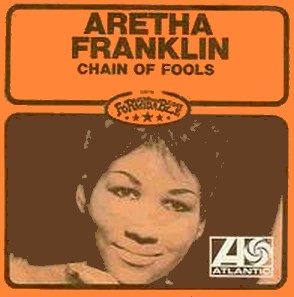
"Chain of Fools" is a song written by Don Covay. Aretha Franklin first released the song as a single in 1967 and subsequently it appeared on many of her albums. It hit number one on the Billboard Hot Rhythm & Blues chart and number two on Billboard's Hot 100 chart. In the lyrics, the singer has been with her boyfriend for five years but realizes she's one of his "chain of fools," women with whom he's been cheating. Others tell her to leave him, but she says his love is too strong and she's too weak. Yet someday, she predicts the chain will break.

Jayne Mansfield was an actress, singer, playmate and stage show performer who had an enormous impact on popular culture of the late 1950s despite her limited success in Hollywood. She has remained a well-known subject in popular culture ever since. During a period between 1956 and 1957, there were about 122,000 lines of copy and 2,500 photographs that appeared in newspapers. In an article on her in the St. James Encyclopedia of Popular Culture (1999), Dennis Russel said that "Although many people have never seen her movies, Jayne Mansfield remains, long after her death, one of the most recognizable icons of 1950s celebrity culture." In the novel Child of My Heart (2004) by Alice McDermott, a National Book Award winning writer, the 1950s is referred to as "in those Marilyn Monroe/Jayne Mansfield days". R. L. Rutsky and Bill Osgerby has claimed that it was Mansfield along with Marilyn Monroe and Brigitte Bardot who made the bikini popular.
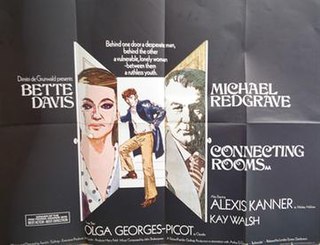
Connecting Rooms is a 1970 British drama film written and directed by Franklin Gollings. The screenplay is based on the play The Cellist by Marion Hart. The film stars Bette Davis, Michael Redgrave, and Leo Genn.

"Beat Dis" is a song by British act Bomb the Bass, a studio production 'group' formed by producer Tim Simenon originally as the Rhythm King All Stars, with producer Pascal Gabriel and Adele Nozedar from Indians in Moscow involved too.

Single Room Furnished is a 1968 drama film featuring Jayne Mansfield in her final "filmed" starring role. The film is based on the stage play of the same title by Gerald Sanford, adapted by Matt Cimber, who also directed. The screenplay is by Michael Musto.
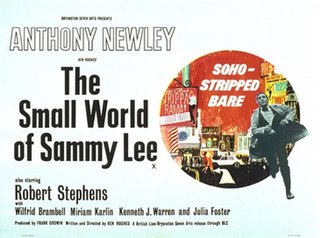
The Small World of Sammy Lee is a 1963 British black-and-white comedy-drama crime film written and directed by Ken Hughes and starring Anthony Newley, Julia Foster and Robert Stephens. The film was based on the 1958 BBC TV one-character television play Sammy, also directed by Hughes and starring Newley, described by Variety as "a masterful piece of work."
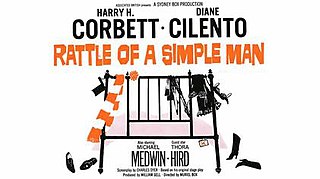
Rattle of a Simple Man is a 1964 British comedy-drama film directed by Muriel Box and starring Diane Cilento, Harry H. Corbett and Michael Medwin. It was written by Charles Dyer, based on his 1962 play La Crécelle(Rattle of a Simple Man).
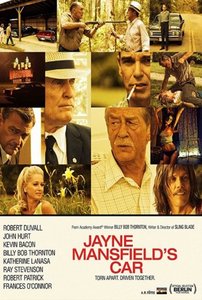
Jayne Mansfield's Car is a 2012 drama film directed by Billy Bob Thornton, marking his first fiction directing job since 2000's All the Pretty Horses. Thornton also stars alongside Robert Duvall, John Hurt, Kevin Bacon, Ray Stevenson, Frances O'Connor, Ron White, and Robert Patrick. The film had its world premiere at the 62nd Berlin International Film Festival in February 2012. The film was released in limited release on September 13, 2013.
The Wild, Wild World of Jayne Mansfield is a 1968 mondo documentary film chronicling the travels of actress Jayne Mansfield. It was directed by Charles W. Broun, Jr., Joel Holt and Arthur Knight.

The Look of Love is a 2013 British biopic of Paul Raymond, directed by Michael Winterbottom. It stars Steve Coogan as Raymond. The film was released in the United Kingdom on 26 April 2013.
Gus Stevens Seafood Restaurant & Buccaneer Lounge was a restaurant and supper club on US Highway 90 in Biloxi, Mississippi. Gus Stevens, the Greek-American owner, came to the Gulf Coast in 1946.

Where Has Poor Mickey Gone? is a 1964 second feature British horror film directed by Gerry Levy and starring Warren Mitchell, John Malcolm, Raymond Armstrong, John Challis and Christopher Robbie. It was written by Levy. When harassed by a group of young thugs, a magician takes his revenge.

















